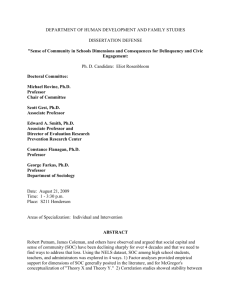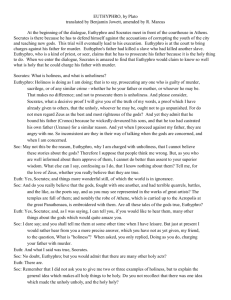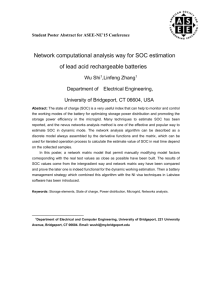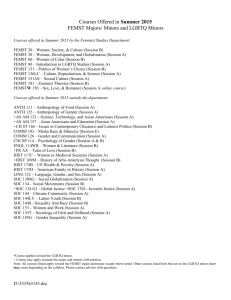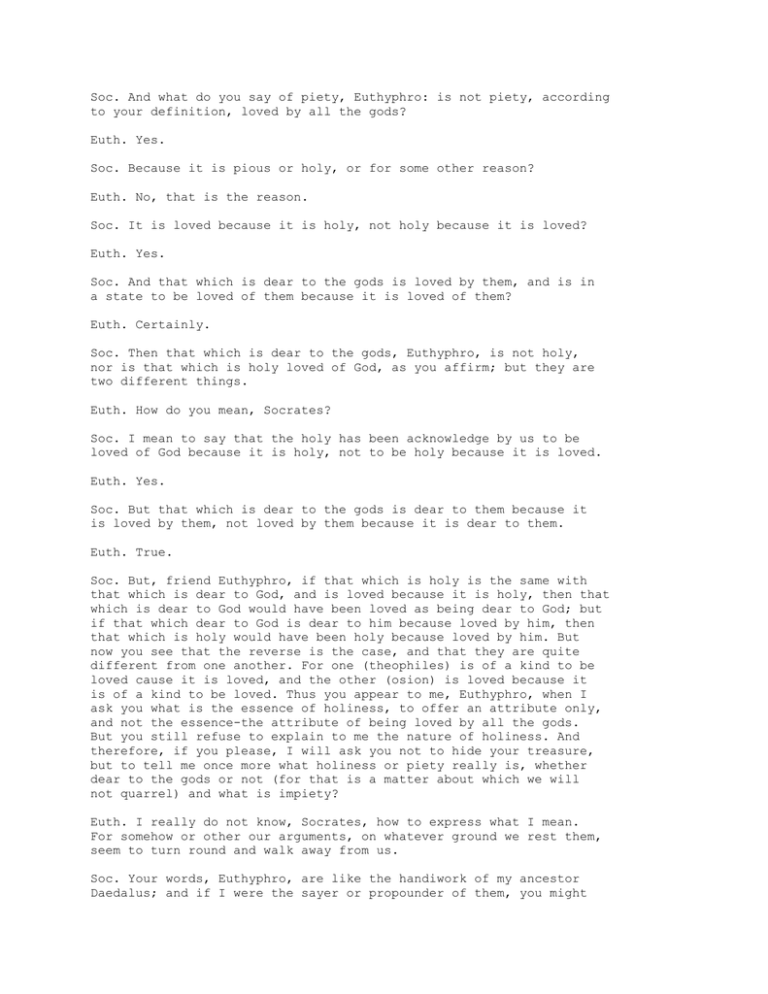
Soc. And what do you say of piety, Euthyphro: is not piety, according
to your definition, loved by all the gods?
Euth. Yes.
Soc. Because it is pious or holy, or for some other reason?
Euth. No, that is the reason.
Soc. It is loved because it is holy, not holy because it is loved?
Euth. Yes.
Soc. And that which is dear to the gods is loved by them, and is in
a state to be loved of them because it is loved of them?
Euth. Certainly.
Soc. Then that which is dear to the gods, Euthyphro, is not holy,
nor is that which is holy loved of God, as you affirm; but they are
two different things.
Euth. How do you mean, Socrates?
Soc. I mean to say that the holy has been acknowledge by us to be
loved of God because it is holy, not to be holy because it is loved.
Euth. Yes.
Soc. But that which is dear to the gods is dear to them because it
is loved by them, not loved by them because it is dear to them.
Euth. True.
Soc. But, friend Euthyphro, if that which is holy is the same with
that which is dear to God, and is loved because it is holy, then that
which is dear to God would have been loved as being dear to God; but
if that which dear to God is dear to him because loved by him, then
that which is holy would have been holy because loved by him. But
now you see that the reverse is the case, and that they are quite
different from one another. For one (theophiles) is of a kind to be
loved cause it is loved, and the other (osion) is loved because it
is of a kind to be loved. Thus you appear to me, Euthyphro, when I
ask you what is the essence of holiness, to offer an attribute only,
and not the essence-the attribute of being loved by all the gods.
But you still refuse to explain to me the nature of holiness. And
therefore, if you please, I will ask you not to hide your treasure,
but to tell me once more what holiness or piety really is, whether
dear to the gods or not (for that is a matter about which we will
not quarrel) and what is impiety?
Euth. I really do not know, Socrates, how to express what I mean.
For somehow or other our arguments, on whatever ground we rest them,
seem to turn round and walk away from us.
Soc. Your words, Euthyphro, are like the handiwork of my ancestor
Daedalus; and if I were the sayer or propounder of them, you might
say that my arguments walk away and will not remain fixed where they
are placed because I am a descendant of his. But now, since these
notions are your own, you must find some other gibe, for they certainly,
as you yourself allow, show an inclination to be on the move.
Euth. Nay, Socrates, I shall still say that you are the Daedalus who
sets arguments in motion; not I, certainly, but you make them move
or go round, for they would never have stirred, as far as I am concerned.
Soc. Then I must be a greater than Daedalus: for whereas he only made
his own inventions to move, I move those of other people as well.
And the beauty of it is, that I would rather not. For I would give
the wisdom of Daedalus, and the wealth of Tantalus, to be able to
detain them and keep them fixed. But enough of this. As I perceive
that you are lazy, I will myself endeavor to show you how you might
instruct me in the nature of piety; and I hope that you will not grudge
your labour. Tell me, then-Is not that which is pious necessarily
just?
Euth. Yes.
Soc. And is, then, all which is just pious? or, is that which is pious
all just, but that which is just, only in part and not all, pious?
Euth. I do not understand you, Socrates.
Soc. And yet I know that you are as much wiser than I am, as you are
younger. But, as I was saying, revered friend, the abundance of your
wisdom makes you lazy. Please to exert yourself, for there is no real
difficulty in understanding me. What I mean I may explain by an illustration
of what I do not mean. The poet (Stasinus) singsOf Zeus, the author and creator of all these things,
You will not tell: for where there is fear there is also
reverence. Now I disagree with this poet. Shall I tell you in what
respect?
Euth. By all means.
Soc. I should not say that where there is fear there is also reverence;
for I am sure that many persons fear poverty and disease, and the
like evils, but I do not perceive that they reverence the objects
of their fear.
Euth. Very true.
Soc. But where reverence is, there is fear; for he who has a feeling
of reverence and shame about the commission of any action, fears and
is afraid of an ill reputation.
Euth. No doubt.
Soc. Then we are wrong in saying that where there is fear there is
also reverence; and we should say, where there is reverence there
is also fear. But there is not always reverence where there is fear;
for fear is a more extended notion, and reverence is a part of fear,
just as the odd is a part of number, and number is a more extended
notion than the odd. I suppose that you follow me now?
Euth. Quite well.
Soc. That was the sort of question which I meant to raise when I asked
whether the just is always the pious, or the pious always the just;
and whether there may not be justice where there is not piety; for
justice is the more extended notion of which piety is only a part.
Do you dissent?
Euth. No, I think that you are quite right.
Soc. Then, if piety is a part of justice, I suppose that we should
enquire what part? If you had pursued the enquiry in the previous
cases; for instance, if you had asked me what is an even number, and
what part of number the even is, I should have had no difficulty in
replying, a number which represents a figure having two equal sides.
Do you not agree?
Euth. Yes, I quite agree.
Soc. In like manner, I want you to tell me what part of justice is
piety or holiness, that I may be able to tell Meletus not to do me
injustice, or indict me for impiety, as I am now adequately instructed
by you in the nature of piety or holiness, and their opposites.
Euth. Piety or holiness, Socrates, appears to me to be that part of
justice which attends to the gods, as there is the other part of justice
which attends to men.
Soc. That is good, Euthyphro; yet still there is a little point about
which I should like to have further information, What is the meaning
of "attention"? For attention can hardly be used in the same sense
when applied to the gods as when applied to other things. For instance,
horses are said to require attention, and not every person is able
to attend to them, but only a person skilled in horsemanship. Is it
not so?
Euth. Certainly.
Soc. I should suppose that the art of horsemanship is the art of attending
to horses?
Euth. Yes.
Soc. Nor is every one qualified to attend to dogs, but only the huntsman?
Euth. True.
Soc. And I should also conceive that the art of the huntsman is the
art of attending to dogs?
Euth. Yes.
Soc. As the art of the ox herd is the art of attending to oxen?
Euth. Very true.
Soc. In like manner holiness or piety is the art of attending to the
gods?-that would be your meaning, Euthyphro?
Euth. Yes.
Soc. And is not attention always designed for the good or benefit
of that to which the attention is given? As in the case of horses,
you may observe that when attended to by the horseman's art they are
benefited and improved, are they not?
Euth. True.
Soc. As the dogs are benefited by the huntsman's art, and the oxen
by the art of the ox herd, and all other things are tended or attended
for their good and not for their hurt?
Euth. Certainly, not for their hurt.
Soc. But for their good?
Euth. Of course.
Soc. And does piety or holiness, which has been defined to be the
art of attending to the gods, benefit or improve them? Would you say
that when you do a holy act you make any of the gods better?
Euth. No, no; that was certainly not what I meant.
Soc. And I, Euthyphro, never supposed that you did. I asked you the
question about the nature of the attention, because I thought that
you did not.
Euth. You do me justice, Socrates; that is not the sort of attention
which I mean.
Soc. Good: but I must still ask what is this attention to the gods
which is called piety?
Euth. It is such, Socrates, as servants show to their masters.
Soc. I understand-a sort of ministration to the gods.
Euth. Exactly.
Soc. Medicine is also a sort of ministration or service, having in
view the attainment of some object-would you not say of health?
Euth. I should.
Soc. Again, there is an art which ministers to the ship-builder with
a view to the attainment of some result?
Euth. Yes, Socrates, with a view to the building of a ship.
Soc. As there is an art which ministers to the housebuilder with a
view to the building of a house?
Euth. Yes.
Soc. And now tell me, my good friend, about the art which ministers
to the gods: what work does that help to accomplish? For you must
surely know if, as you say, you are of all men living the one who
is best instructed in religion.
Euth. And I speak the truth, Socrates.
Soc. Tell me then, oh tell me-what is that fair work which the gods
do by the help of our ministrations?
Euth. Many and fair, Socrates, are the works which they do. Soc. Why,
my friend, and so are those of a general. But the chief of them is
easily told. Would you not say that victory in war is the chief of
them?
Euth. Certainly.
Soc. Many and fair, too, are the works of the husbandman, if I am
not mistaken; but his chief work is the production of food from the
earth?
Euth. Exactly.
Soc. And of the many and fair things done by the gods, which is the
chief or principal one?
Euth. I have told you already, Socrates, that to learn all these things
accurately will be very tiresome. Let me simply say that piety or
holiness is learning, how to please the gods in word and deed, by
prayers and sacrifices. Such piety, is the salvation of families and
states, just as the impious, which is unpleasing to the gods, is their
ruin and destruction.
Soc. I think that you could have answered in much fewer words the
chief question which I asked, Euthyphro, if you had chosen. But I
see plainly that you are not disposed to instruct me-dearly not: else
why, when we reached the point, did you turn, aside? Had you only
answered me I should have truly learned of you by this time the-nature
of piety. Now, as the asker of a question is necessarily dependent
on the answerer, whither he leads-I must follow; and can only ask
again, what is the pious, and what is piety? Do you mean that they
are a, sort of science of praying and sacrificing?
Euth. Yes, I do.
Soc. And sacrificing is giving to the gods, and prayer is asking of
the gods?
Euth. Yes, Socrates.
Soc. Upon this view, then piety is a science of asking and giving?
Euth. You understand me capitally, Socrates.
Soc. Yes, my friend; the. reason is that I am a votary of your science,
and give my mind to it, and therefore nothing which you say will be
thrown away upon me. Please then to tell me, what is the nature of
this service to the gods? Do you mean that we prefer requests and
give gifts to them?
Euth. Yes, I do.
Soc. Is not the right way of asking to ask of them what we want?
Euth. Certainly.
Soc. And the right way of giving is to give to them in return what
they want of us. There would be no, in an art which gives to any one
that which he does not want.
Euth. Very true, Socrates.
Soc. Then piety, Euthyphro, is an art which gods and men have of doing
business with one another?
Euth. That is an expression which you may use, if you like.
Soc. But I have no particular liking for anything but the truth. I
wish, however, that you would tell me what benefit accrues to the
gods from our gifts. There is no doubt about what they give to us;
for there is no good thing which they do not give; but how we can
give any good thing to them in return is far from being equally clear.
If they give everything and we give nothing, that must be an affair
of business in which we have very greatly the advantage of them.
Euth. And do you imagine, Socrates, that any benefit accrues to the
gods from our gifts?
Soc. But if not, Euthyphro, what is the meaning of gifts which are
conferred by us upon the gods?
Euth. What else, but tributes of honour; and, as I was just now saying,
what pleases them?
Soc. Piety, then, is pleasing to the gods, but not beneficial or dear
to them?
Euth. I should say that nothing could be dearer.
Soc. Then once more the assertion is repeated that piety is dear to
the gods?
Euth. Certainly.
Soc. And when you say this, can you wonder at your words not standing
firm, but walking away? Will you accuse me of being the Daedalus who
makes them walk away, not perceiving that there is another and far
greater artist than Daedalus who makes them go round in a circle,
and he is yourself; for the argument, as you will perceive, comes
round to the same point. Were we not saying that the holy or pious
was not the same with that which is loved of the gods? Have you forgotten?
Euth. I quite remember.
Soc. And are you not saying that what is loved of the gods is holy;
and is not this the same as what is dear to them-do you see?
Euth. True.
Soc. Then either we were wrong in former assertion; or, if we were
right then, we are wrong now.
Euth. One of the two must be true.
Soc. Then we must begin again and ask, What is piety? That is an enquiry
which I shall never be weary of pursuing as far as in me lies; and
I entreat you not to scorn me, but to apply your mind to the utmost,
and tell me the truth. For, if any man knows, you are he; and therefore
I must detain you, like Proteus, until you tell. If you had not certainly
known the nature of piety and impiety, I am confident that you would
never, on behalf of a serf, have charged your aged father with murder.
You would not have run such a risk of doing wrong in the sight of
the gods, and you would have had too much respect for the opinions
of men. I am sure, therefore, that you know the nature of piety and
impiety. Speak out then, my dear Euthyphro, and do not hide your knowledge.
Euth. Another time, Socrates; for I am in a hurry, and must go now.
Soc. Alas! my companion, and will you leave me in despair? I was hoping
that you would instruct me in the nature of piety and impiety; and
then I might have cleared myself of Meletus and his indictment. I
would have told him that I had been enlightened by Euthyphro, and
had given up rash innovations and speculations, in which I indulged
only through ignorance, and that now I am about to lead a better life.
THE END
---------------------------------------------------------------------Copyright statement:
The Internet Classics Archive by Daniel C. Stevenson, Web Atomics.
World Wide Web presentation is copyright (C) 1994-2000, Daniel
C. Stevenson, Web Atomics.
All rights reserved under international and pan-American copyright
conventions, including the right of reproduction in whole or in part
in any form. Direct permission requests to classics@classics.mit.edu.
Translation of "The Deeds of the Divine Augustus" by Augustus is
copyright (C) Thomas Bushnell, BSG.
</pre></body></html>


